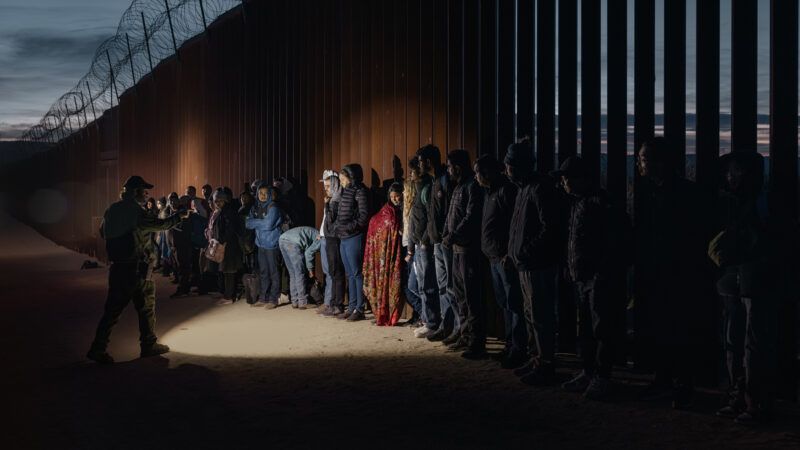The Good and the Bad of the Senate Border Bill
It mixes much-needed reform with changes that could upend the asylum system in damaging ways.

A bipartisan group of senators unveiled a long-awaited border security bill on Sunday night that links a plethora of immigration-related provisions to funding for Ukraine, Israel, and Taiwan, the culmination of four months of negotiations. The 370-page, $118 billion proposal, released by Sens. Kyrsten Sinema (I–Ariz.), James Lankford (R–Okla.), and Chris Murphy (D–Conn.), would bring dramatic changes to the U.S. immigration system if passed.
Several House and Senate lawmakers have already voiced their opposition to the bill, suggesting a tough road to passage. House Majority Leader Steve Scalise (R–La.) said the bill wouldn't receive a vote in his chamber, a sentiment that Speaker Mike Johnson (R–La.) echoed, calling it "dead on arrival" in the House. Over a dozen Republican senators are reportedly already against the bill, as are Sens. Bernie Sanders (I–Vt.), Bob Menendez (D–N.J.), and Alex Padilla (D–Calif.).
The bill is slated for a first vote in the Senate on Wednesday and seems to face long odds in the House. Still, it's worth examining key provisions in this bill, if for no other reason than to understand what constitutes compromise border legislation these days.
The border security package includes some boosts for legal immigration and legal immigrants, including "work authorization for family members of certain visa holders" and 50,000 additional employment and family-based visas per year for five years. It would provide relief to so-called Documented Dreamers, dependent visa holders who were brought to the U.S. legally as children by parents on nonimmigrant visas. They would be protected from "aging out" of legal status at 21 if they don't secure a green card (a situation that forces some Documented Dreamers to self-deport).
The package includes the Afghan Adjustment Act, which would eventually provide "permanent legal status to tens of thousands of Afghan nationals" who assisted the U.S. and were evacuated here following the August 2021 Taliban takeover of Afghanistan. It also aims to establish more efficient vetting processes for Afghan allies still located overseas.
The bill would most drastically affect the asylum system, making it harder for migrants to qualify for protection. It has some good intentions—for example, quicker adjudication of protection claims, which often takes years under the current system—but it would require a massive investment of resources to accomplish and the upending of certain legal standards, likely to the detriment of due process and humanitarian protection.
The bill would create "a new temporary expulsion authority" to be used "when migrant numbers overwhelm the system," according to a summary of the package. The Department of Homeland Security would have to close the border "if the daily average of migrant encounters reaches 5,000 over a week" or "8,500 in a single day," something that Johnson opposes because "the goal should be zero illegal crossings a day." Ports of entry would "process at least 1,400 migrants daily during periods" when the authority was in use, and the migrants would be subject to a "new enhanced asylum standard and removal authority."
The American Immigration Lawyers Association warned that "rapid and truncated procedures" would "undermine the fairness and thoroughness of asylum screenings" and put asylum seekers at risk "by pushing them back to unsafe and violent conditions." Immigrant advocacy organizations, including FWD.us and the Coalition for Humane Immigrant Rights, criticized the asylum changes and the bill's failure to outline a pathway to citizenship for the country's undocumented people.
The package would preserve the status quo in some good and some bad ways. It would maintain a key measure used by the Biden administration to relieve border pressures: humanitarian parole. President Joe Biden has used the authority to establish a legal pathway to entry for Cubans, Haitians, Nicaraguans, and Venezuelans, which has been successful in reducing illegal border crossings among those nationalities. But, as the National Immigration Forum has noted, it doesn't offer solutions for Dreamers or the country's farm work force.
As is usually the case with too-big, too-expensive bills, the border security package would throw money at unprepared agencies in ill-conceived ways. The infusion of cash is so far beyond immigration agencies' current budgets, the Cato Institute's David J. Bier argued, "that it's likely that the agencies will have to engage in gross financial mismanagement just to spend it within the required timeframes." The package's funding is intended to hire 4,338 asylum officers, but it's anybody's guess how long that will take.
These kinds of lingering questions may never be resolved, given House opposition to the package. Even if the bill passes, lawmakers will have a more difficult task ahead: finding long-lasting solutions for nearly every level of the U.S. immigration system, from the undocumented people who already call the country home to the highly educated, highly skilled people who have no workable way to migrate and launch new lives here.


Show Comments (63)